


![]()
ONLINE

Success Breeds Success
Editors’ Note
Prince Alwaleed bin Talal was born in Riyadh and educated in the U.S. He obtained a degree in Business Administration and graduated Magna Cum Laude from Menlo College in 1979 and earned a Master of Social Science degree with Honors from Syracuse University in 1985. Prince Alwaleed was ranked 26th in the 2011 Forbes magazine list of billionaires and is now the largest single investor in Citigroup. Individually and through his foundations, Prince Alwaleed has made philanthropic grants and donations in over 60 countries, totaling more than $3 Billion over the past 30 years.
Company Brief
Kingdom Holding Company (KHC; www.kingdom.com.sa) maintains holdings in some of the world’s best known companies and brands in an array of sectors including banking, media, information technology, retail, business, health care, entertainment, and tourism. KHC’s investments include stakes in Citigroup and News Corp and real estate holdings including the Four Seasons, Fairmount, and Mövenpick hotel chains, as well as properties like the Plaza Hotel in New York, the George V in Paris, and London’s Savoy Hotel.
You have been very vocal about the need for change in the Middle East. What are your thoughts about the changes going on now and what needs to happen to secure a stable future in the region?
Several revolutions have taken place in the Middle East and North Africa region, in Egypt, Tunisia, and Libya, and there are others in the making, such as Yemen. Syria is also developing into a dangerous situation.
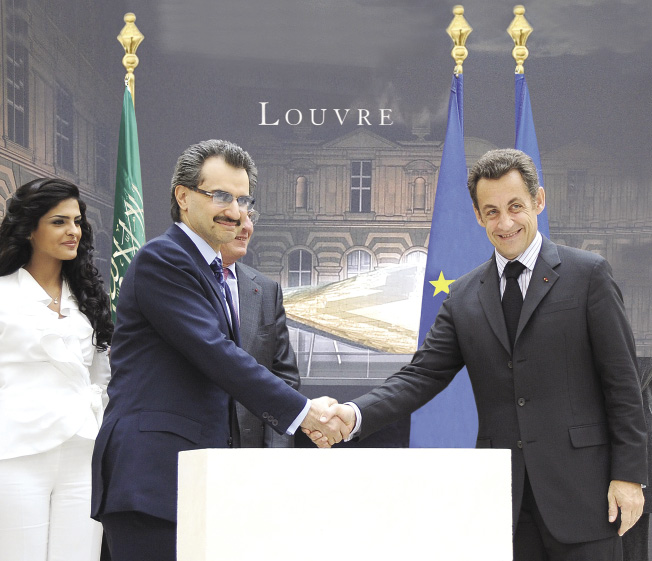
French President Nicolas Sarkozy with Prince Alwaleed
and Princess Ameerah at the Louvre Museum
The common denominator among these revolutions is that the people in those countries would like to have a say and participate in the process of shaping their societies.
The Arab countries that now have stability but still haven’t latched onto what is happening in our region have to learn lessons and start adopting at least some of what the people want.
What more can be done to achieve a better East/West understanding?
Following 9/11, the gap between West and East widened, and more importantly, the gap between the Arab world and the United States, and to make it even more dangerous, between Christianity and Islam.
We have to do our best to make sure the gap is bridged among those communities. We’re doing our best in the world of academia by having centers at the American University in Beirut and the American University in Cairo educate people in our region about the American system and its way of life.
We have two centers in the best universities in the U.K. – Cambridge and Edinburgh – and we have centers at two universities on the East Coast of the U.S. – Harvard and Georgetown. We have also established an Islamic center inside the Louvre in Paris.
The sponsor of all these centers is the Alwaleed Bin Talal Foundation, whose focus is to find common ground in the worlds of academia, art, and culture in order to bridge the gap as much as we can.
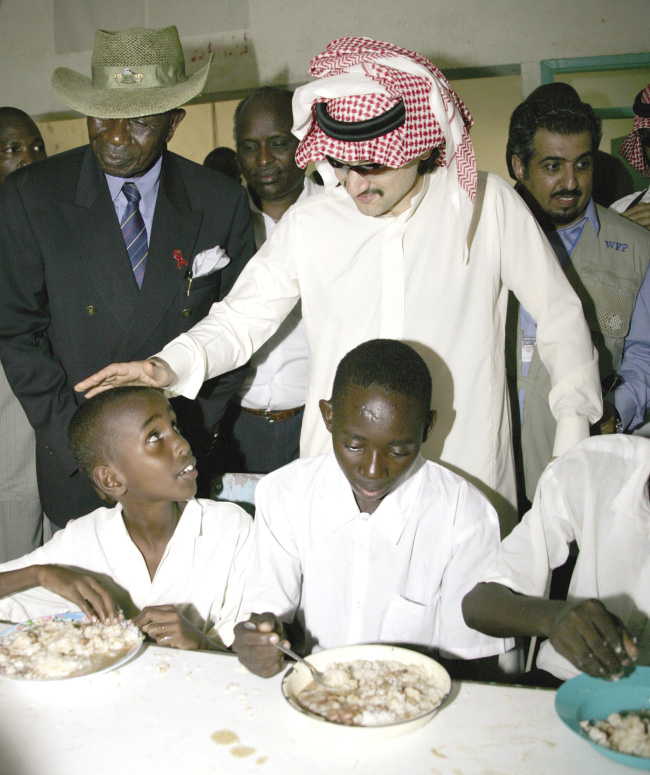
HRH Prince Alwaleed bin Talal with Vice President Moody Awori
and UNWFP Special Ambassador Abdulaziz Arrukban participate
in distribution of UNWFP relief aid packages.
What areas are the foundations involved in?
We have several areas of concentration: one is focused on bridging the gap between communities and societies and religions; another division focuses on female empowerment in Saudi Arabia; another on alleviating poverty and educating people in our country and our region; and another assists those countries that face catastrophes or natural disasters such as the tsunami in Japan.
Has the progress on women’s empowerment been as strong as you had hoped?
Any society, community, or country that doesn’t have 50 percent of its population participating in the system and the society or the advancement of its economic development cannot be functioning normally.
Since we began this process several years ago, there have been a lot of moves along that front whereby women are becoming incorporated into the society and system.
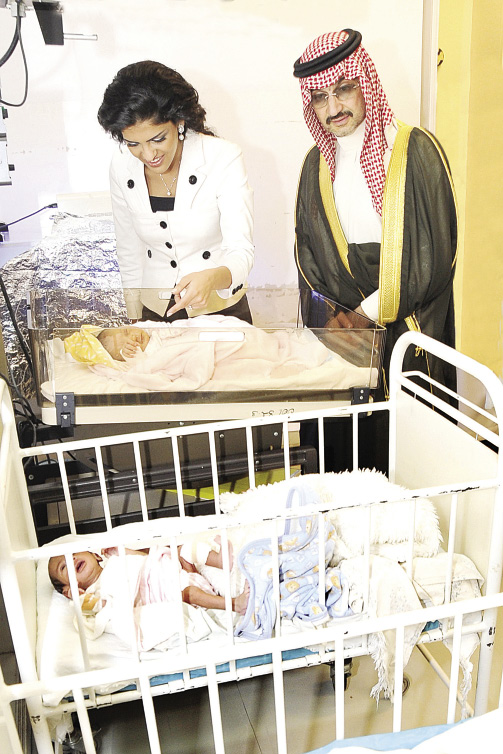
Prince Alwaleed and Princess Ameerah in Eritrea
I use my national, regional, and international presence to advance that cause by giving women the platform to be public, to be vocal, and to ask for equal rights. We’re not asking for more rights for them – just equal rights with men so they can perform their duties on the national front in Saudi Arabia. In comparing the Saudi Arabia of today with that of four or five years ago, there has been a big improvement.
Have we reached our goals? No. We are way short of them, but we will keep fighting until we reach our goals.
You are the largest investor in the U.S. What are the most important characteristics you look for in deciding to invest in a company?
You need good management that you believe will be there at least for three to five years. News Corp., for example, is an international media company. There are many local and regional media companies in the States, Europe, and Japan, but you have no international company involved in media like News Corp., which has interests in Australia, Japan, the U.K., Germany, Italy, America, and Latin America. There is not only good management but good profitability as well.
The Four Seasons is a unique brand that caters to five-, six-, and seven-star clientele and it’s difficult to find another hotel management company to compete with it.
So it’s making sure that there is value, differentiation, good management, good cash flow, and the potential for profitability and increased value of the share price.
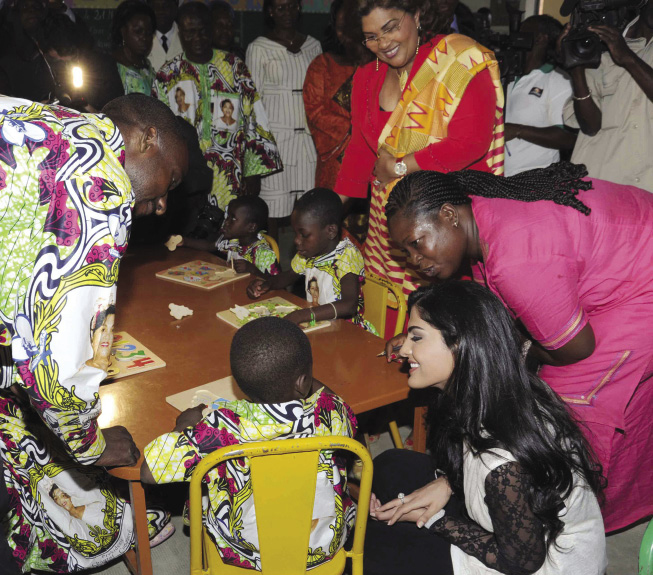
Burkina Faso’s First Lady and Princess Ameerah with orphans from
the “Prince Alwaleed bin Talal Village” orphanage in Burkina Faso
Were you surprised by the severity of the economic downturn and have the right steps been taken globally for growth?
We only began to see an end to the economic tsunami that began in the summer of 2007 in 2010. Things are stabilizing now and it was a good scaffolding that the government put in place with QE1 and QE2, but right now, it has to be taken out. But there is concern that once you take out the QE2, this will again shock the economic system.
I don’t believe it will be shocking, because once you take the scaffolding out, you assume the building can stand alone; otherwise, the construction is bad.
It was a nasty blow that impacted the whole world, but we are seeing now indications that the worst is over and we’re getting back out from under it.
In terms of investing in the future, many suggest the U.S. is no longer the area for growth and the emphasis is being placed on the BRIC markets and Southeast Asia. Are you more focused on those developing markets?
The U.S. is down but not out. There is no growth right now, and for that matter, not in the OECD countries or Japan either.
But in the BRIC countries and other countries with high growth rates, there are risks – foreign exchange risks, political risks, and tax risks.
The investment climate is not as stable as in the U.S. So you may not get good growth at present in the U.S. and OECD countries, but you have stability.
And in the BRICs or third-world countries, you have to be ready for some surprises.
At the end of the day, it’s high risk, high reward; low risk, low reward.
What characteristics make a successful leader today, especially in business?
A successful businessman has to have a plan and objectives, as well as a mission statement, and has to have the guts to make decisions that sometimes might not be popular short term.
You have to be a leader and sometimes make decisions that may not be appreciated by either the community or your managers. Nevertheless, you can’t just be a one-man show. We established these traits at KHC a long time ago, and we are proud of that.
Our corporate governance policies preceded all the scandals and problems that took place in the States and before U.S. companies were forced to reform. For example, the relationship between me and my company, Kingdom Holding, was established since we had our IPO. So it was important to me early on.
No matter what corporate governance systems you implement, doesn’t it come down to human nature at the end of the day?
Sure. Human nature is full of shortcomings, but a good leader will not accept shortcuts or any of the things that taint his name, because once your name is tainted as a leader, it’s very difficult to recoup. You can build a company for 20 or 30 years and in five minutes, you can ruin it with one scandal or problem, no matter how small. So it’s important to keep your name clean and pure.
Many on your management team have worked with you for a long time and know you well. If I was talking to them without you in the room and I asked what it was like to work for Prince Alwaleed, what would they say?
With me, what you see is what you get. I’m tough, I’m to the point, and I give a manager a second chance for a mistake, but not a third chance. It’s inevitable to make mistakes, because if you don’t take risks you don’t make mistakes, but you have to learn from them.
Plus, we have very high standards of ethics – that is very important to me. The norm in the U.S. now is to have high values and make sure that people are honorable, but that should be a given. You shouldn’t have to go through a crisis to understand that this is necessary.
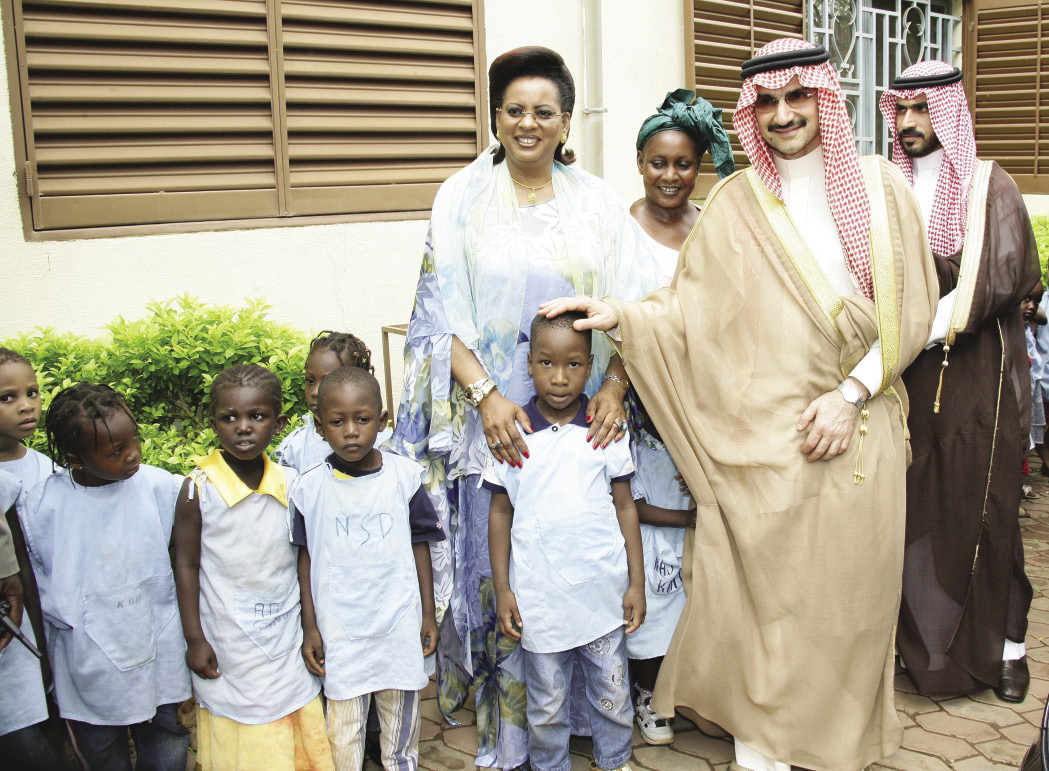
Prince Alwaleed with the First lady of Mali
Many around the world say there is a lack of leadership today. Do you agree?
It’s an evolving situation. Each era has its own leaders in business and in politics. So I don’t believe good leaders have disappeared. But some leaders are worried now and are being careful not to bring about a scandal or problem.
But I don’t think that the world lacks leaders in politics, economics, finance, or business.
What are you most concerned with globally to make sure we get on the right path?
With what is happening in the Middle East and the problems in the U.S. and Europe, there are a lot of challenges, but also a lot of opportunities. In the U.S. specifically, the challenges have to be faced with good leadership and Congress has to work more closely with the President and resolve the problems.
Do you ever turn off the business?
I believe in networking, because today business, economics, and finance are intertwined with politics. So in business, you have to be in politics and economics as well, especially in our part of the world.
What do you do to relax?
You have to have time for work and time for your mind and body. My way of doing business is that no matter how big the crisis, you have to accept it with an open heart and mind; shouting and screaming doesn’t help. Remain composed and absorbed, and be rational in your approach.
Any company is only as good as its people. If you don’t have good people, not under you, but with you, each within his or her own field, who are at least equal to you if not better, it won’t work. Because you are working on so many fronts and anyone who claims he can manage all of it simultaneously is going to fail.
I believe in what Reagan used to say: “Trust, but Verify”. And if someone does well, you reward him. If he doesn’t do well, you penalize him and give him a warning, but at day’s end, you have to change.
What advice would you give to young people today looking for inspiration as to their future?
When students graduate, they need an objective and a mission statement, and they need to determine their risk appetite and their direction. It’s the job of the father and mother, as well as the community, to give direction. That is why our communities, societies, and nations have to open up discussion, to give the youth more direction and more opportunity to prepare themselves for being leaders in business, economics, finance, or even in politics.
You have touched so many lives through the foundation. Do you ever take the time to appreciate all you have done?
I believe in working hard and being successful, because success breeds success and that drives me.
But it’s also about helping your immediate community, the society, the nation, and the whole world in general. That’s why we have these different aspects – to help as much as we can in the world.•